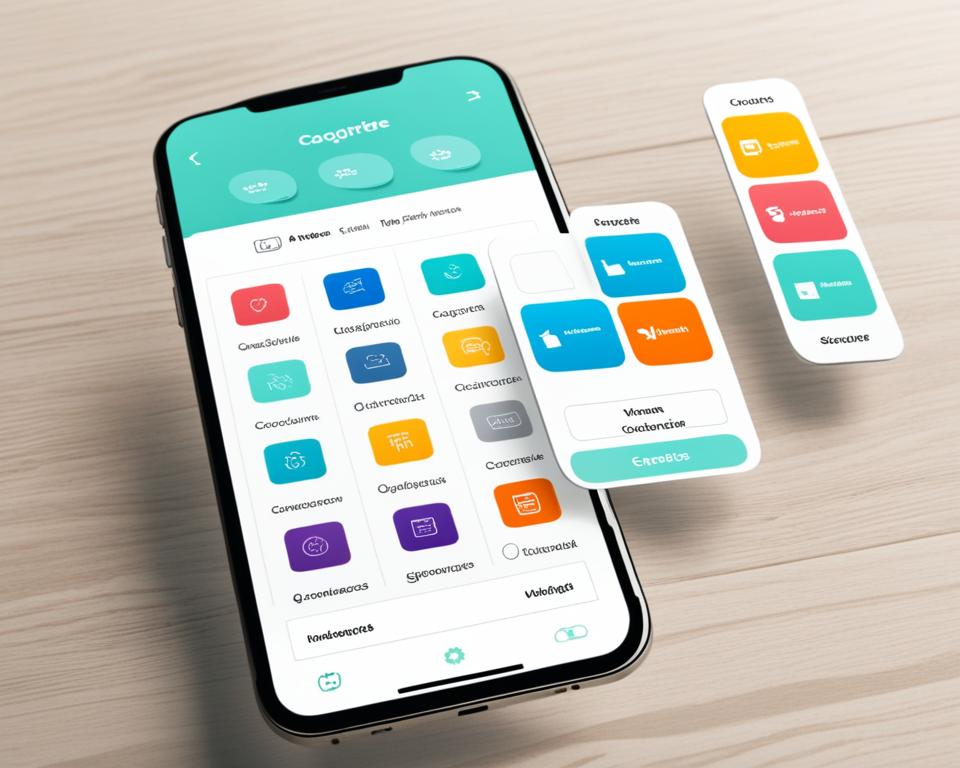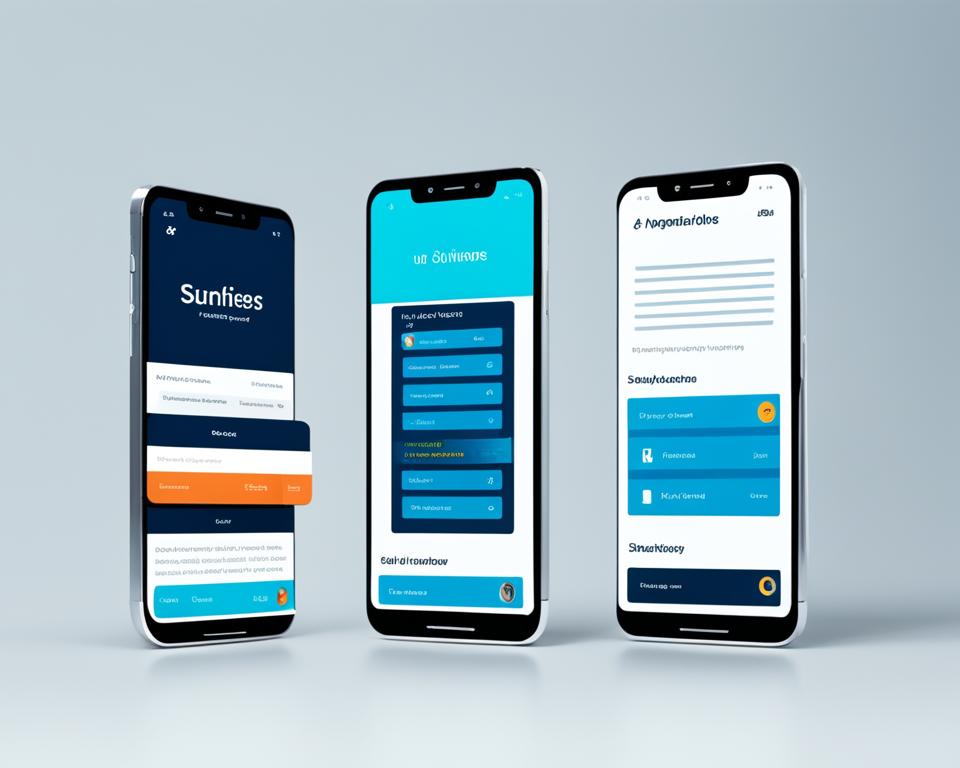In today’s digital world, mobile app development is key. It’s about making software for smartphones and tablets. These apps can do many things, from helping with work to entertaining users. The field is always changing to meet what people want.
Creating mobile apps means designing, coding, testing, and releasing them for systems like iOS and Android. This article will cover what mobile app development is all about. We’ll look at the different kinds of apps, how they’re made, and what’s new in the field. It will also share tips for making great mobile apps.
Table of Contents
Key Takeaways
- Mobile application development is the process of creating software programs for mobile devices, such as smartphones and tablets.
- It involves designing, coding, testing, and deploying apps for different mobile operating systems, including iOS and Android.
- Mobile apps offer a wide range of functionalities and experiences, catering to diverse user needs and preferences.
- The mobile app development landscape is constantly evolving, with emerging trends and technologies shaping the future of the industry.
- Developing a successful mobile app requires a comprehensive understanding of the development process, best practices, and challenges.
Definition of Mobile Application Development
In today’s world, making mobile apps is key as more folks use their phones and tablets for daily tasks, fun, and staying in touch. Mobile application development means creating software for mobile devices. It covers making, testing, and sharing these apps on different mobile platforms.
Understanding the Concept
Mobile application development is all about designing, coding, and putting together software for mobile devices. These apps use the special features of phones and tablets, like touchscreens and GPS, to give users a smooth experience anywhere.
Importance in the Digital Age
- More people use mobile devices, making apps a big part of our lives. They want apps that are easy to use and packed with features.
- Apps make life easier by handling tasks like messaging and work, letting users get info and services anywhere.
- For businesses, having a strong mobile app can help them stand out. It lets them connect better with their customers.
In our digital age, the role of mobile apps is huge. They’re key for connecting people, making user experiences better, and helping businesses grow. As tech keeps getting better, mobile application development will keep leading the way in changing how we use technology.
Types of Mobile Applications
In the world of mobile tech, there are many types of mobile apps for different needs and likes. These mobile application classifications cover a lot of mobile app categories. Each one has its own purpose and special features.
Gaming apps are super popular, giving users fun and engaging experiences anywhere. Productivity apps help users get work done better and manage tasks well. Social media apps keep people connected and let them talk to each other easily. E-commerce apps make online shopping smooth and easy.
Entertainment apps, like music and video streaming, offer lots of content to keep users hooked. Utility apps, such as weather and navigation, solve everyday problems. There are also apps for special industries or interests, adding more variety for users.
Choosing the right mobile application type depends on many things. These include who the app is for, what it needs to do, and its goals. Knowing about the types of mobile apps and their mobile application classifications helps developers make apps that meet users’ needs and likes.
| Mobile App Category | Description | Examples |
|---|---|---|
| Gaming Apps | Provide immersive and entertaining gaming experiences for users | Candy Crush, Pokémon GO, Angry Birds |
| Productivity Apps | Help users streamline their workflow and manage tasks efficiently | Google Calendar, Trello, Evernote |
| Social Media Apps | Foster connectivity and communication among users | Facebook, Instagram, Twitter |
| E-commerce Apps | Enable seamless online shopping experiences for users | Amazon, eBay, Etsy |
| Entertainment Apps | Offer a diverse range of content to engage and captivate users | Netflix, Spotify, YouTube |
| Utility Apps | Provide practical solutions to everyday challenges | Weather apps, Google Maps, Flashlight apps |
Understanding the many mobile application types and their mobile app categories helps developers make apps for everyone’s needs in today’s digital world.
Native vs. Hybrid vs. Web-based Apps
There are three main types of apps for mobile development: native mobile apps, hybrid mobile apps, and web-based mobile apps. Each type has its own pros and cons. They fit different needs and use cases.
Native Apps: Pros and Cons
Native mobile apps are made just for one mobile system, like iOS or Android. They use the device’s full power for better performance and offline use. But, making native apps takes more time and money because you need different code for each platform.
Hybrid Apps: Advantages and Disadvantages
Hybrid mobile apps use web tech like HTML, CSS, and JavaScript. This lets them work on many platforms. They’re cheaper to make and keep up, but might not perform as well as native apps. Still, they can use device features and work offline, making them popular for many businesses.
| Comparison Factors | Native Apps | Hybrid Apps | Web-based Apps |
|---|---|---|---|
| Performance | Excellent | Good | Moderate |
| User Experience | Excellent | Good | Moderate |
| Development Cost | High | Moderate | Low |
| Maintenance | Moderate | Moderate | Low |
| Offline Functionality | Excellent | Good | Limited |
| Platform Reach | Limited | Broad | Broad |
Knowing the good and bad of each app type helps businesses pick the right one for their needs and goals.
Mobile App Development Platforms
In the world of mobile apps, iOS and Android lead the way. These platforms have changed how we use our devices. They support countless innovative apps.
iOS Development Platform
iOS is made by Apple and runs on iPhones and iPads. It’s known for its clean design, easy use, and strong security. Developers love it for its tools and resources.
Android Development Platform
Android is made by Google and is used by many phone and tablet makers. It’s flexible and lets developers reach lots of users. It has great tools and a big community of developers.
Choosing the right platform for app development is key. Developers must think about who they want to reach and what their app needs. Knowing about iOS and Android helps them make the best choices.
“The choice between iOS and Android development is often dictated by the specific needs and goals of the project, as well as the target audience and device compatibility requirements.”
What Is Mobile Application Development?
Mobile application development means making software for mobile devices like smartphones and tablets. It includes planning, designing, making, testing, and putting out apps. These apps are made for the special features and limits of mobile devices.
The definition of mobile application development covers making a mobile app from start to finish. You need to know a lot about mobile devices, their systems, what users like, and trends in the market.
Now, mobile apps are a big part of our lives. They change how we get info, talk to each other, and do things on the move. What is mobile app development is always changing with new tech and more people wanting apps that are easy to use.
| Key Aspects of Mobile Application Development | Description |
|---|---|
| Platform-Specific Development | Apps are made for certain mobile systems like iOS or Android. This needs special skills and tools. |
| User Experience (UX) Design | Creating interfaces that are easy to use and fun. This includes thinking about screen size, touch, and how the device is held. |
| Performance Optimization | Making sure the app works well on different devices. This means saving battery life, not using too much memory, and staying connected. |
| Testing and Quality Assurance | Testing to find and fix problems. Making sure the app works on all devices and is easy and fun to use. |
Mobile app development is always changing with new tech and more people wanting apps. Knowing the basics and important parts of what is mobile app development is key. It helps businesses and developers make apps that meet what users want today.
The Mobile App Development Process
Creating a successful mobile app takes many steps. It starts with planning and strategy and ends with testing. Each step is key to making a great user experience.
Planning and Strategy
The first step in mobile app development is planning and making strategic choices. It’s about knowing who will use the app, what it will do, and what the project needs. By understanding what users want and the app’s main goals, developers can make a plan for the whole project.
Design and Prototyping
In the design and prototyping stage, the app’s look and feel are made. Mobile app design focuses on making the app easy to use and fun. Prototyping lets developers test and improve the design early on, making sure it’s what users expect.
Development and Testing
The mobile app development and testing phase is where the app is built. Developers use coding to add features and make sure the app works well. They check the app often to fix problems before it’s released.
By going through these important steps, teams can make apps that really meet users’ needs and stand out online.
Mobile App Monetization Strategies
In the world of mobile apps, developers look for new ways to make money. Choosing the right way to make money is key to success. They use in-app purchases, subscriptions, ads, and sponsorships to make money and reach their goals.
The freemium model is a popular choice. It lets users try the app for free but pay for more features. This way, more people can try the app, and some will pay for more.
In-app ads are another way to make money. Developers show ads in their apps to make money. These ads can make the app more interesting and useful for users.
Some apps make money through subscriptions. Users pay regularly to get special features or content. This approach builds a loyal user base and helps the app stay profitable.
Choosing how to make money from an app depends on who uses it and what it does. By picking the best way to make money, developers can grow their app business.
“The key to successful mobile app monetization is finding the right balance between user experience and revenue generation.”
Mobile App Security and Privacy Concerns
In today’s world, mobile apps are a big part of our lives. This makes mobile app security and user privacy more important than ever. Developers need to focus on keeping user data safe and respecting privacy.
Data Protection and Encryption
Keeping user data safe is key in making mobile apps. Developers should use strong data protection methods, like encryption, to keep sensitive info safe. They should use top encryption methods and secure ways to store data. This way, user data stays safe, even if there’s a security issue.
User Privacy and Permissions
User privacy is also vital in making mobile apps. Developers must ask for the right permissions and be clear about how they use user data. Being open with users helps build trust and shows a commitment to their privacy.
- Implement end-to-end encryption to protect user data
- Obtain user consent for data collection and usage
- Clearly communicate privacy policies and data handling practices
- Regularly review and update security measures to stay ahead of evolving threats
By tackling mobile app security and privacy concerns, developers can gain user trust. This helps protect personal info and ensures their apps succeed over time.
“Security and privacy are not just features, they are the foundation of a successful mobile app.”
The Future of Mobile App Development
The mobile app world is changing fast, with new tech and trends leading the way. We’re seeing big changes that will change how we use mobile apps.
Emerging Trends and Technologies
5G networks are becoming a big deal in mobile app development. They offer super-fast internet, low delay, and better connections. This means apps can be more interactive and handle more data. The future of mobile app development is closely tied to the expansion of 5G technology.
AI and ML are also making a mark in mobile apps. They make apps smarter, more personal, and able to learn from us. Emerging mobile app trends are heavily influenced by the integration of AI and ML capabilities.
AR and VR are changing how we use mobile apps too. These techs make digital content come alive, offering new ways to engage, entertain, and work. New mobile app technologies, such as AR and VR, are redefining the future of the industry.
The IoT is also playing a big role in app development. More devices are connecting, and apps are becoming key for controlling and managing these smart systems. The future of mobile app development is closely tied to the growth of the IoT and its impact on app functionality and user experiences.
As the mobile app industry grows, these trends and tech will shape its future. They bring new chances for innovation, better user experiences, and more connections between devices and platforms.
Mobile App Development Best Practices
Creating a successful mobile app means following key best practices. These best practices for mobile app development, mobile app development guidelines, and mobile app development principles help make the app top-notch, easy to use, and up-to-date.
First, it’s vital to do deep market research to know what users want and like. This helps developers make an app that connects with people and solves their problems.
- Analyze competitor apps and identify unique value propositions
- Gather user feedback through surveys, interviews, and usability testing
- Continuously iterate and refine the app based on user insights
Creating a great user interface (UI) and user experience (UX) is also key. A good UI makes the app look great and easy to use, which keeps users happy and engaged.
- Implement intuitive and consistent navigation patterns
- Optimize screen layouts and typography for optimal readability
- Incorporate responsive design principles to ensure seamless performance across various devices
It’s also crucial to make sure the app performs well, even on older devices. This means:
- Minimizing app size and reducing load times
- Optimizing image and asset delivery
- Implementing caching strategies to enhance responsiveness
Finally, keeping the app safe and protecting user privacy is a must. Following top security practices and data protection rules builds trust with users and lowers the risk of security issues.
By using these best practices for mobile app development, mobile app development guidelines, and mobile app development principles, developers can make apps that meet user needs and last in the fast-changing digital world.
Building a Successful Mobile App Development Team
Creating a successful mobile app takes a team with a mix of skills. You’ll need project managers, user experience designers, developers for iOS and Android, quality assurance engineers, and marketing analysts. Each team member should have technical, design, and strategic skills for the app’s success.
Essential Skills and Roles
For a top-notch mobile app development team, you need the right skills and roles. Here are the key ones:
- Project Managers – They manage the project timeline, resources, and team for smooth delivery.
- UX Designers – They make user interfaces that are easy to use and look good, improving the app’s functionality and user engagement.
- Mobile App Developers – These developers know how to work on iOS, Android, or both, building the app’s core features and integrating them well.
- Quality Assurance Engineers – They check the app’s quality, performance, and standards, finding and fixing bugs.
- Marketing/Business Analysts – They understand what the target audience likes, help optimize the app for stores, and find ways to make money.
With these roles and skills, mobile app companies can make a successful app. It will meet user needs and hit business goals.
| Role | Key Skills |
|---|---|
| Project Manager | Project management, team coordination, resource allocation, risk management |
| UX Designer | User research, interface design, prototyping, usability testing |
| iOS Developer | Swift, Objective-C, Xcode, iOS SDK, Core iOS frameworks |
| Android Developer | Java, Kotlin, Android Studio, Android SDK, Material Design principles |
| QA Engineer | Test case design, automated testing, performance testing, bug reporting |
| Marketing/Business Analyst | Market research, app store optimization, monetization strategies, user engagement analytics |
With these roles and skills, companies can make a successful app. It will meet user needs and hit business goals.
Mobile App Development Tools and Resources
In the world of mobile app development, the right tools and resources are key. Developers have many tools at their disposal, like IDEs, frameworks, testing tools, and open-source libraries. These help make their work easier and improve their apps.
Integrated Development Environments (IDEs)
Android Studio and Xcode are top choices for making mobile apps. Android Studio is for Android apps and has everything needed for coding, testing, and releasing apps. Xcode is for making iOS and macOS apps and is from Apple.
Cross-Platform Frameworks
Frameworks like React Native and Flutter help developers work across different platforms. They let developers make apps for both Android and iOS with just one set of code. This saves time and money.
Testing and Debugging Tools
Testing and debugging tools are vital for making sure apps work well. Appium is great for automated testing, Stetho for Android apps, and Xcode’s built-in tools for iOS apps.
Open-Source Libraries and APIs
The mobile app community offers many open-source libraries and APIs. These can add lots of features to apps, from user interfaces to data storage and even machine learning and augmented reality.
Using these tools and resources helps developers work better, make their apps better, and speed up the development process. As mobile apps keep changing, it’s important for developers to keep up with new tools and tech.
Challenges and Solutions in Mobile App Development
Creating mobile apps is tough and full of hurdles. Developers face issues like different devices and limited resources. They also worry about user privacy and changing app store rules. But, by keeping up with trends, following best practices, and using the right tools, developers can beat these challenges and make great apps.
One big challenge is making apps work on many devices. With so many operating systems and device types, it’s hard to make sure an app fits everyone. Developers plan carefully, test on different devices, and use frameworks that work across platforms.
Mobile devices have limited resources like memory and battery life. Developers must make their apps use less and work well on all devices. They use code optimization, manage assets well, and focus on saving power to solve this.
User privacy and data security are huge concerns. Developers must follow strict rules and protect user data. They use strong security, like encryption and secure login, to keep users safe and build trust.
To beat these challenges, developers need to keep up with trends and use the latest tech. They should use tools that make development easier, listen to user feedback, and focus on making a great user experience. This way, they can make apps that users love and help businesses grow.
“The key to overcoming mobile app development challenges is to stay agile, adapt to changes, and continuously improve the user experience.” – Jane Doe, Mobile App Development Expert
In short, making mobile apps is complex and requires developers to tackle many challenges. By staying informed, using best practices, and choosing the right tools, they can make apps that users love and meet their needs.
Conclusion
Mobile app development is now a key part of our digital world. It changes how we live and work. By knowing the basics, types, and how to make mobile apps, developers can make apps that meet today’s needs.
As more people use mobile apps, it’s important for developers to keep up with new trends and changes. This will help them make apps that stand out and meet user expectations.
This summary shows how important and flexible mobile app development is. It covers what mobile apps are, their types, and how they’re made. It also talks about the best ways to make money from apps and keep them safe and private.
Mobile app developers need to stay alert and ready to change. They should follow the latest trends and tech to make apps that are both new and focused on users. By doing this, they can help businesses and people reach new goals, improve customer experiences, and lead in digital changes.














